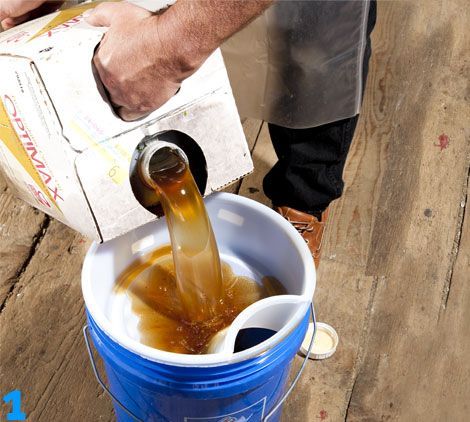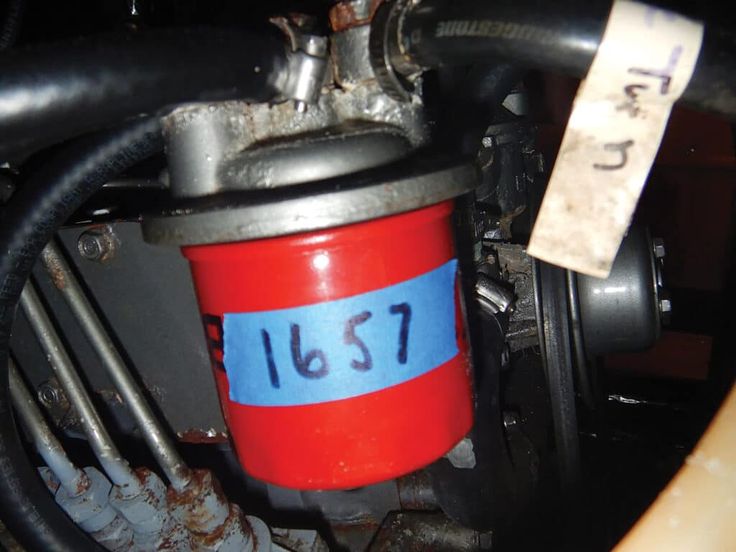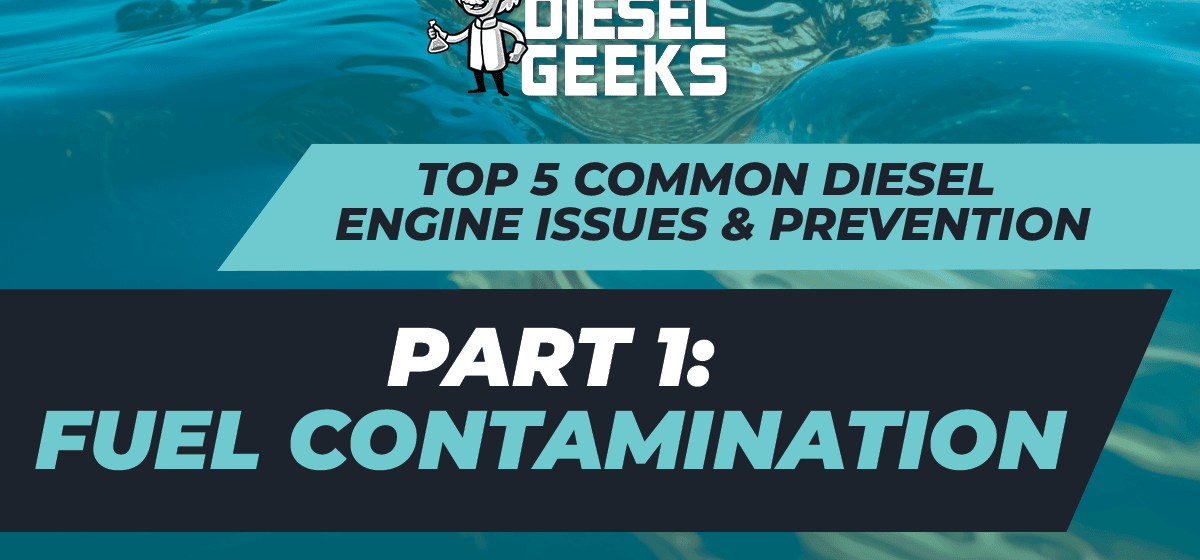Fuel Contamination – Top 5 Common Diesel Engine Issues & Prevention – Part 1
1. Fuel Contamination
Contaminated diesel fuel can introduce water, dirt, and debris into your engine, leading to clogged fuel filters and injectors. This can significantly reduce engine performance or even lead to costly repairs. Prevention involves regularly changing filters, using a fuel-water separator, and sourcing clean fuel from trusted suppliers.
2. Injector Problems
Diesel fuel injectors are critical for precise fuel delivery, but they can wear out or clog over time. Contaminants in the fuel, such as water, dirt, or algae, can lead to injector blockage and wear. Clogged injectors affect performance, causing rough idling, reduced power, and increased fuel consumption. Prevention includes routine injector cleaning, using high-quality fuel, and adding trusted fuel additives to minimise fuel contamination and keep injectors functioning optimally.
3. Diesel Exhaust Emission Controls
Modern diesel engines come equipped with emission control systems like Diesel Particulate Filters (DPFs) and Selective Catalytic Reduction (SCR) to meet emission standards. These systems can get clogged or fail, leading to poor engine performance and increased emissions. Prevention requires using quality diesel, avoiding short trips that don’t allow for proper DPF regeneration, and ensuring proper system maintenance.
4. EGR Valve and Intake Carbon Buildup
Exhaust Gas Recirculation (EGR) valves are prone to carbon buildup, which can cause them to fail, along with issues in the intake manifold and Exhaust Gas Temperature (EGT) coolers. Fuel contamination—such as low-grade diesel or water in the fuel—can worsen carbon deposits and accelerate wear. These failures often lead to engine inefficiency, overheating, or even more severe mechanical damage. Prevention involves regular cleaning of the EGR system, using high-quality diesel fuel, and ensuring proper filtration to minimise both carbon buildup and fuel contamination.
5. Poor Maintenance
A lack of regular maintenance is one of the leading causes of diesel engine issues. Failure to perform routine oil changes, filter replacements, and system checks can cause significant wear on the engine, resulting in poor performance and higher repair costs. Prevention is simple—stick to a scheduled maintenance plan and use quality parts and fluids to keep your engine running smoothly, These introductory paragraphs offer a snapshot of each issue and how proactive maintenance can help avoid costly problems down the line.
For Part 1 – Lets look at Fuel Contamination in more detail

Fuel Contamination
Fuel contamination is one of the most frequent and damaging issues in diesel engines. Unlike gasoline engines, diesel engines rely heavily on fuel cleanliness due to their high-pressure fuel systems. Contaminated diesel fuel can lead to a wide range of problems, from clogged filters to severe engine failure. Understanding the various types of contaminants, the damage they cause, and how to prevent them is essential for keeping your diesel engine running smoothly.
A) Types of Fuel Contamination
Contamination in diesel fuel can take many forms, and each poses a distinct threat to your engine’s performance. The three primary types of contamination are:
- Physical Particles: These are typically dust, dirt, rust, or other solid debris that enters the fuel system through various means. They may come from poorly maintained fuel storage tanks, dirty fuel cans, or even from wear and tear inside the fuel system itself. When these particles enter the fuel, they can quickly clog fuel filters, reducing fuel flow. Over time, particles that bypass the filter can accumulate in fuel injectors, reducing their efficiency and causing poor fuel atomization. This results in rough engine performance, poor fuel economy, and even damage to the injector nozzles.
- Water Contamination: Water in diesel fuel can be a significant issue. It can enter the fuel tank through condensation, poor-quality fuel, or even from refueling at stations with inadequate tank maintenance. Since diesel fuel is less dense than water, the water sinks to the bottom of the tank, where it can corrode fuel system components like injectors and pumps. Water also promotes microbial growth, which can create a sludge that further contaminates the fuel and clogs filters.
- Chemical Contamination: Contaminants like solvents, improper fuel additives, or chemicals from fuel storage containers can degrade the quality of diesel fuel. This type of fuel contamination can affect the combustion process, leading to inefficient burning, increased emissions, and damage to internal engine components such as the fuel injectors and turbocharger.
The most significant that we deal with here in Australia is to do with the Fatty Acid Solvents that they use to clean out the delivery tankers. If you get Diesel that has trace amounts remaining (and leave your vehicle stagnant) for any period of time, this chemical within the fuel can actually cause super hard salt crystals to form inside the injectors. These crystals then proceed to tear apart the injector from the inside out.
The only fuel additive that I have seen that deals with this is the Penrite Diesel Compete Clean Pro Series: “Protect & cleans internal carboxylate salt deposits that cause sticking in diesel fuel injectors”
B) When You Can Expect an Issue
One of the most critical things to understand about fuel contamination is how quickly it can affect your engine. Modern diesel engines circulate fuel at a rapid rate. In most systems, the entire fuel tank is cycled through the engine within about an hour. This rapid cycling is partly for cooling purposes but also acts as a form of “fuel polishing,” where contaminants are continuously removed by the fuel filter.
However, this fast circulation also means that if you fill up with contaminated fuel, you’ll likely see a warning light within the first hour of driving. The contaminated fuel will have circulated through the pump and returned to the tank several times, giving contaminants ample opportunity to clog filters and injectors. In extreme cases, such as filling up with severely contaminated fuel, you might experience engine performance issues almost immediately
C) Damage Caused By Fuel Contamination
The damage from fuel contamination goes beyond just clogged fuel injectors. Contaminants can affect the entire fuel system, from the fuel tank to the injectors, and even reach the combustion chamber. In some engines, like the Ford Ranger’s P5AT engine, contamination can lead to injectors jamming in the open position. This causes uncontrolled fuel flow, which can lead to catastrophic engine failure if not addressed immediately.
Additionally, while many focus on injector damage, there’s also a significant risk to other components like the Diesel Particulate Filter (DPF). Any physical particles that make it past the fuel filter and cannot fully burn off during combustion will accumulate as ash in the DPF. Over time, this ash builds up, causing blockages that eventually require the DPF to be removed and professionally cleaned—a time-consuming and expensive process.
D) Filtration
Diesel fuel filters play a critical role in preventing contamination from reaching the engine, but it’s essential to understand what your factory filter is capable of. Filters are typically rated by their micron size and efficiency. A 5-micron filter with a 98% efficiency rating means it will filter out 98% of particles larger than 5 microns, allowing 2% to pass through. While this level of filtration is generally effective, it’s not perfect, especially over time. As a filter accumulates contaminants, its efficiency decreases, which is why regular filter replacements are vital.
Fuel polishing—the process of continuously cycling fuel through the filter—helps to reduce the number of contaminants in the fuel tank over time. However, relying solely on the factory filter is often insufficient. Installing a secondary 2-micron fuel filter can help capture finer particles missed by the primary filter. It’s also important to change filters more frequently than recommended, especially if you suspect you’ve filled up with contaminated fuel.
Prevention of Fuel Contamination

Preventing fuel contamination is crucial for maintaining your diesel engine’s health and longevity. Here are key steps to reduce the risk of contaminated fuel:
- Use Reputable Fuel Retailers: One of the easiest ways to avoid fuel contamination is by refuelling only at trusted, high-quality fuel stations. These retailers typically follow strict fuel storage and maintenance protocols, which reduce the chance of contaminants like water, dirt, and chemical additives entering your fuel tank. Make it a habit to choose fuel stations that prioritise cleanliness and have a reputation for delivering clean fuel.
- Avoid Refuelling During Tanker Deliveries: Many drivers don’t realise that refuelling while the station is being topped off by a fuel tanker can increase the risk of fuel contamination. During delivery, the process stirs up sediment and other debris from the bottom of the fuel tanks, which then gets suspended in the fuel. It’s best to wait for a few hours after a delivery before refuelling to allow particles to settle back at the bottom of the station’s storage tanks.
- Install a Secondary Fuel Filter System: Factory fuel filters are often rated at around 5 microns, which can leave smaller particles free to circulate within your fuel system. To add an extra layer of protection, consider installing a secondary 2-micron filter. This additional filtration will significantly reduce the number of smaller contaminants reaching your injectors and other sensitive components. A secondary filter is especially useful for vehicles frequently driven in areas with poor fuel quality or where contamination risks are higher.
- Replace Factory Filters Regularly: Even the most efficient filters lose their effectiveness as they become clogged with debris. This reduces their ability to filter contaminants, allowing more particles to bypass the system. Replacing your fuel filters more frequently than recommended—especially if you suspect fuel contamination—will help maintain optimal engine performance. Periodic inspection of filters is also vital, as many issues can arise long before the filter is due for a scheduled replacement.
- Using Diesel Additive BEFORE parking your vehicle for a period of time: Using an additive like the Penrite Complete Clean Pro Series that will help remove the Salt deposits before you park your vehicle for any period longer than 10 days will help these deposits stop from occurring in the first place and quickly remove them if they do minimising irreversible damage that may be caused.
By following these preventative measures, you can significantly reduce the risk of fuel contamination and ensure the longevity of your diesel engine. It’s a small investment of time and effort that can save you from much larger repair costs in the future. If you’re keen on more diesel tech tips, DIY guides, and workshop breakdowns, follow me on YouTube – Diesel Geeks.


